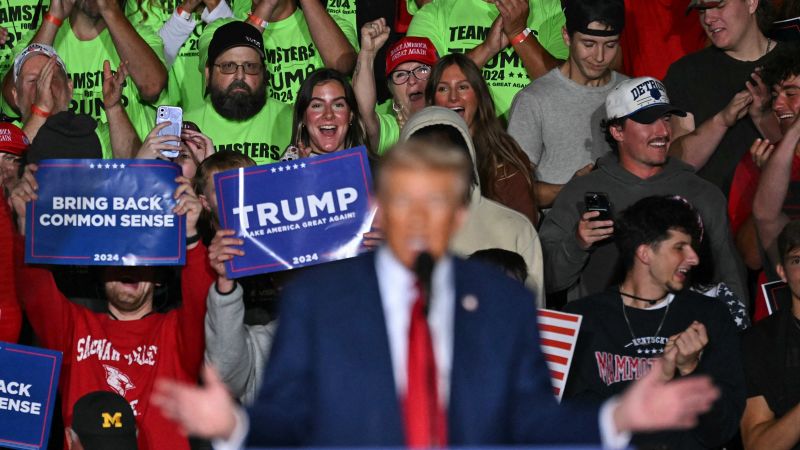The Trump campaign in Michigan is taking an untraditional approach to outreach and voter engagement, focusing on irregular voters and teaching supporters to surveil polling places. This strategy includes a push for election integrity training and lawsuits to prevent voter registration in some areas. The campaign has also received financial support from a super PAC aligned with tech billionaire Elon Musk. Critics within the GOP are skeptical of this approach, calling it political malpractice and a Hail Mary.
The campaign believes this strategy is best suited for a candidate like Trump, who has unique appeal among disengaged voters and a celebrity status that can attract those who don’t typically vote. They are targeting new voters in areas that were previously neglected in previous campaigns, such as central Michigan and Detroit. The focus is on turnout rather than persuasion, with an emphasis on low and mid-propensity voters who are less likely to be contacted by campaigns traditionally.
The Trump campaign has relied on outside groups like Turning Point Action and America PAC for traditional ground game efforts such as voter registration and teaching people how to vote. This partnership allows the campaign to focus its resources on advertising and rallies. Musk’s America PAC has made significant investments in canvassing, direct mail, digital advertising, texting campaigns, and phone banking. However, the effectiveness of these efforts remains unclear, as the groups have little experience running political operations.
The battleground strategy in other states follows a similar pattern, targeting specific demographics such as African American men, Jewish voters, Cuban and Venezuelan communities. Efforts are also made to divide the Democratic coalition by targeting Arab American citizens and Catholic voters. Some Republican operatives remain skeptical of this approach, questioning its effectiveness and whether it can lead to a victory in the upcoming election. There are concerns about the coordination and overlap of efforts on the ground.
The Republican National Committee has emphasized its election integrity work in key battleground states, focusing on recruiting poll workers and partisan poll watchers. Lawsuits have been filed in several states alleging voter roll irregularities and challenging election procedures. In some cases, efforts to work the referees have replaced traditional campaign strategies. Democrats view these efforts as a sign that Trump is more focused on challenging the election outcome if he loses rather than winning the election outright.
Overall, the Trump campaign’s strategy in battleground states like Michigan involves a combination of traditional ground game tactics, untested outreach efforts, and legal challenges to election procedures. While the approach is unconventional, it reflects Trump’s unique appeal among certain voter demographics and a focus on turnout rather than persuasion. Critics remain skeptical of the effectiveness of this strategy and question whether it can lead to a victory in the upcoming election. The battle for key swing states continues, with both campaigns intensifying their efforts in the final stretch before Election Day.


